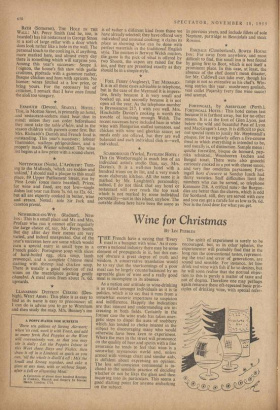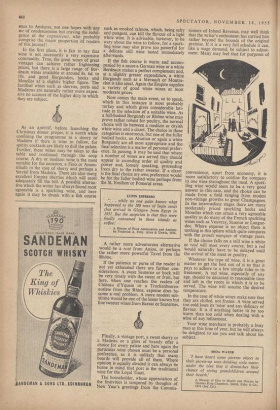Wine for Christmas
BY IAN PEEBLES
THE French have a saying that 'Every meal is a banquet with wine.' As it con- cerns a national industry there may be some element of propaganda in it, but this can- not obscure a great degree of truth and wisdom. A conservative translation would be to say that the shortcomings of a poor meal can be largely counterbalanced by an agreeable glass of wine and a really good meal is incomplete in its absence.
As a nation our attitude to wine-drinking is as varied amongst individuals as it is to politics, which is to say that it runs from a somewhat esoteric expertness to suspicion and indifference. Happily the indications are that interest and understanding are in- creasing in both fielcis. Certainly in the former case the wine trade has taken ener- getic steps to dispel the aura of snobbery Which has tended to choke interest in the subject by discouraging many who would otherwise have been keen to experiment. Where the man in the street will pronounce on the quality of beer and spirits with a fine assurance he tends to feel that wine is a somewhat mysterious world and, unless armed with vintage chart and similar aids, is diffident about expressing an opinion. The less self-conscious continental is in- clined to the sensible practice of deciding whether or not he likes the glass and then inquiring into its particulars. This seems a good starting point for anyone embarking on the subject. The spirit of experiment is surely to be encouraged, but, as in other spheres, the experimenter will probably find that in the long run the conventional tastes, represent- ing the trial and error of generations, are sound and sensible. For instance, let him dtink red wine with fish if he so desires, but he will soon realise that the normal objec- tion to this is purely a matter of taste and not of dogma. Therefore one may perhaps again reiterate these oft-repeated basic prin- ciples of drinking wine, with special refer-
ence to Ansturas, not one hopes with any air of condescension but craving the indul- gence of the cognoscenti, who probably comprise the major proportion of readers of this journal!
In the first place, it is fair to say that wine is not necessarily a very expensive commodity. True, the great wines of great vintages can achieve rather frightening prices, but there is a large range of Bor- deaux wines available at around 8s. 6d. to 10s. and good Burgundies, hocks and MoseIles at a slightly higher figure. The fortified wines such as sherries, ports and Madeiras are naturally rather more expen- sive on account of the higher duty to which they are subject.
As an aperitif, before launching the Christmas dinner proper, it is worth while confining the programme to a sherry or Madeira if there is wine to follow, for spirity cocktails are likely to dull the palate. Further, these wines may be taken to the table and continued through the soup course. A dry or medium wine is the most suitable for the occasion, a Fino or Amon- tillado in the case of sherry and perhaps a Sercial from Madeira. There are also many excellent Empire sherries which will most adequately fill the bill. A possible alterna- tive which the writer has always found most agreeable is a sparkling wine, and here again it may be drunk with a fish course
such as smoked salmon, which, being salty and pungent, can kill the flavour of a light white wine. It is advisable, however, to be wary about the wine to follow, for a spark- ling wine may also prove too powerful for a delicate still wine tasted immediately afterwards.
If the fish course is warm and accom- panied by a sauce a German wine or a white Bordeaux makes a perfect complement and, at a slightly greater expenditure, a white Burgundy such as a Mersault or Montra- chet is also ideal. Again the Empire supplies a variety of good white wines at most moderate prices.
Now comes the main event, so to speak, which in this instance is most probably turkey and which gives considerable lati- tude in the selection of a suitable wine. As a full-bodied Burgundy or Rhone wine may prove rather robust for poultry, the normal choice will lie between a medium or dryish white wine and a claret. The choice in these categories is enormous, but one of the fuller bodied hocks, an Alsatian or again a white Burgundy are all most appropriate and the final selection is a matter of personal prefer- ence. In passing, it may be said that where a number of wines are served they should appear in ascending order of quality and power and, loosely speaking, proceeding from dry to the rather sweeter. If a claret is the final choice my own preference would be for the fuller bodied wine perhaps from the St. Emilion or Pomerol areas.
A rather more adventurous alternative would be a rosé from Anjou, or perhaps the rather more powerful Tavel from the Rhone.
If the patience or purse of the reader is not yet exhausted there are further con- siderations. A sweet Sauterne or hock will be very timely with the sweet or fruit, but here, when one reaches the realms of Château d'Yquem or a Trockenbeeren- auslese from the Rhine, expense does be- come a real problem. A more modest sub- stitute would be one of the lesser known but fine sweeter wines from Barsac or Sauternes.
Finally, a vintage port, a sweet sherry or a Madeira or a glass of brandy offer a choice for every palate and here again the particular wine chosen must be a personal preference, as it is unlikely that many boards will provide all of them. Where opinion is equally divided it can always be borne in mind that port is the traditional wine for the Loyal Toast.
The householder, whose appreciation of the festivities is tempered by thoughts of New Year's greetings from the Commis-
sioners of Inland Revenue, may well think that the writer's enthusiasm has carried him rather beyond the bounds of the original premise. If it is a very full schedule it can, like a wage demand, be subject to adjust- ment. Many may feel that for purposes of
convenience, apart from economy, it is more satisfactory to confine the company to one wine throughout the meal. A spark- ling wine would seem to be a very good answer in this case, and the choice can be made from a field ranging from modest non-vintage growths to great Champagnes. In the intermediate stages there are many moderately priced sparkling hocks and Moselles which can attain a very agreeable quality as do many of the French sparkling wines such as Vouvray, Saumur or Langue- doc. Where expense is no object there is nothing in this sphere which quite compares with the grands marques of vintage years.
If the choice falls on a still wine a white or rose will meet every course, but a red would naturally have to be delayed until the arrival of the meat or poultry.
Whatever the type of wine, it is a great matter to get the best out of it so that it pays to adhere to a few simple rules in its treatment. A red wine, especially of any age, should be decanted in reasonable time and left in the room in which it is to be served. The wine will assume the desired temperature.
In the case of white wines make sure that they are chilled, not frozen. A wine served too cold loses its 'nose' and any delicacy of flavour. It is if anything better to be too warm than too cold when dealing with a wine of any refinement.
Your wine merchant is probably a busy man at this time of year, but he will always be delighted to see you and talk about his subject.











































































 Previous page
Previous page